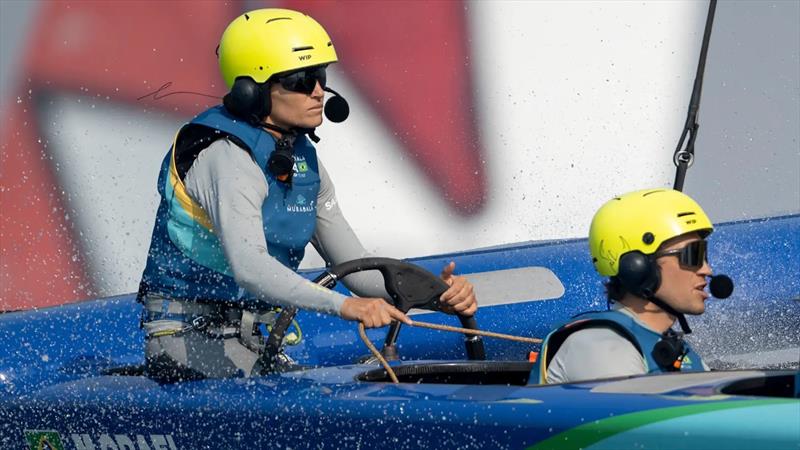
Grael reflects on Mubadala Brazil's first season as SailGP previews 2026 calendar
by SailGP 19 Apr 06:23 PDT

Mubadala Brazil's first season © SailGP
It's been a whirlwind first season for Mubadala Brazil so far. The team, led by SailGP's first female driver and double Olympic champion Martine Grael, entered the league alongside Red Bull Italy at the start of the season.
The first five events served up a diverse set of challenges for a fledgling team - fan favorite venues sitting alongside brand new ones, wildly different conditions and racecourses, plus the rollout of the brand new high-speed T-Foils in Auckland, which the fleet has been grappling with ever since.
Amongst the struggle of getting up to speed as quickly as possible, there have been flashes of brilliance from the new team, including the moment it overtook four boats to move from last to sixth in the third fleet race of Dubai. Then there was the moment the Brazilians were just seconds away from their first ever race win in Los Angeles, before they were pipped to the post by league heavyweight Australia.
Looking back, Grael says the team is experiencing 'two evolutions' simultaneously - 'how we are looking at ourselves from the inside' and 'the results'. Specifically she highlights 'seeing how good we got in-between events and the mistakes we made and we learned from' as key positives. The good thing, she says, is that the team can actively compare itself to the journeys of other fledgling teams on their entrance into the league.
"You can see it wasn't easy for them either," she says. "For teams who started in the first or second seasons and were coming from the America's Cup, they also had their troubles." One notable example is New Zealand, which joined the league in Season 2 and struggled to make notable inroads until Season 3, when it picked up its first ever race win. The aim, she says, is to 'make bigger, faster and better evolutions than' those other teams.
Looking back on the season so far, there hasn't been one event that 'hasn't been challenging', Grael says, adding that 'every event is a challenge'. But a huge highlight was navigating the heavy wind conditions of Auckland and Sydney without having 'any majors'. "You see how well you are doing as a team when you race in rough situations," she says. "In the windy conditions, we held on, we even had some ok races and, after not having any majors, the feedback from the team was that they trust me - that's the message I got. Having that early in the season when we didn't have the expectation to do well in the bigger breeze was good."
Mubadala Brazil hasn't escaped the season completely unscathed though. The team was caught up in an incident with Germany Deutsche Bank in Sydney's practice racing, which resulted in a collision. Despite being the right of way boat, Mubadala Brazil was ruled to not have taken avoiding action soon enough, and incurred an eight point penalty and painful loss of four season points for the incident. At the time, Grael protested the penalty, questioning why her team was penalized when the incident was Germany's fault. But now, Grael says the collision was 'just part of [her] learning about SailGP'.
"In every type of sailing, you are only responsible when you don't have right of way, but in SailGP you're responsible the whole time," she says. "It was just a shift in how to conduct ourselves on the course and how to move forwards". This rule - which requires both the right of way and keep clear boats to make efforts to avoid collisions - 'demands both teams to be looking out', Grael says. Increasing her ability to look outside of the boat is a key improvement area. "Until now I've had such a big time just focusing on things going on inside the boat that it's been so hard to look out," she says. "We're looking forward to the moment where we can anticipate the things coming up and make better tactical calls because right now we're just trying to figure out how to get around the racecourse."
For now, the team's big wins are recovering from mistakes. "You feel really good when you start with a mistake then get over it and start making gains," she says. Key to the team's learning curve is simply ensuring it 'gets more right than wrong'. "We always feel better as a team when we have made more good choices than bad choices," she says. "We have had quite a few moments like that where we felt really good as a team."
Looking ahead, Grael is processing the news that the team's first ever home event in Rio has been canceled to allow the league to carry out essential fleet repairs. This means the F50 fleet will next meet at the Mubadala New York Sail Grand Prix on June 7/8, resulting in a big gap between the United States double header in March and New York in June. Despite the disappointment of Rio's cancelation, Grael is staying positive.
"Having a big gap for us is definitely not a good thing because it stops how fast we were learning, but at the same time it gives us more time to work in the background," she says. Soon enough, the team will be digging into the data and analyzing past performances in an effort to be ready for New York. But for the season as a whole, Grael's ambitions are not focused on results. "I want a lot of teams saying we are a pain in the ass, giving them a hard time and making it difficult for them to beat us," she says. "To be there, fight the fleet, get our elbows out and feel more comfortable in the boat - that's our goal."